Answered step by step
Verified Expert Solution
Question
1 Approved Answer
Basic Research Topic: How does Child Abuse impact into adulthood? Whenever someone has experienced child abuse, there is a buildup of feelings that will
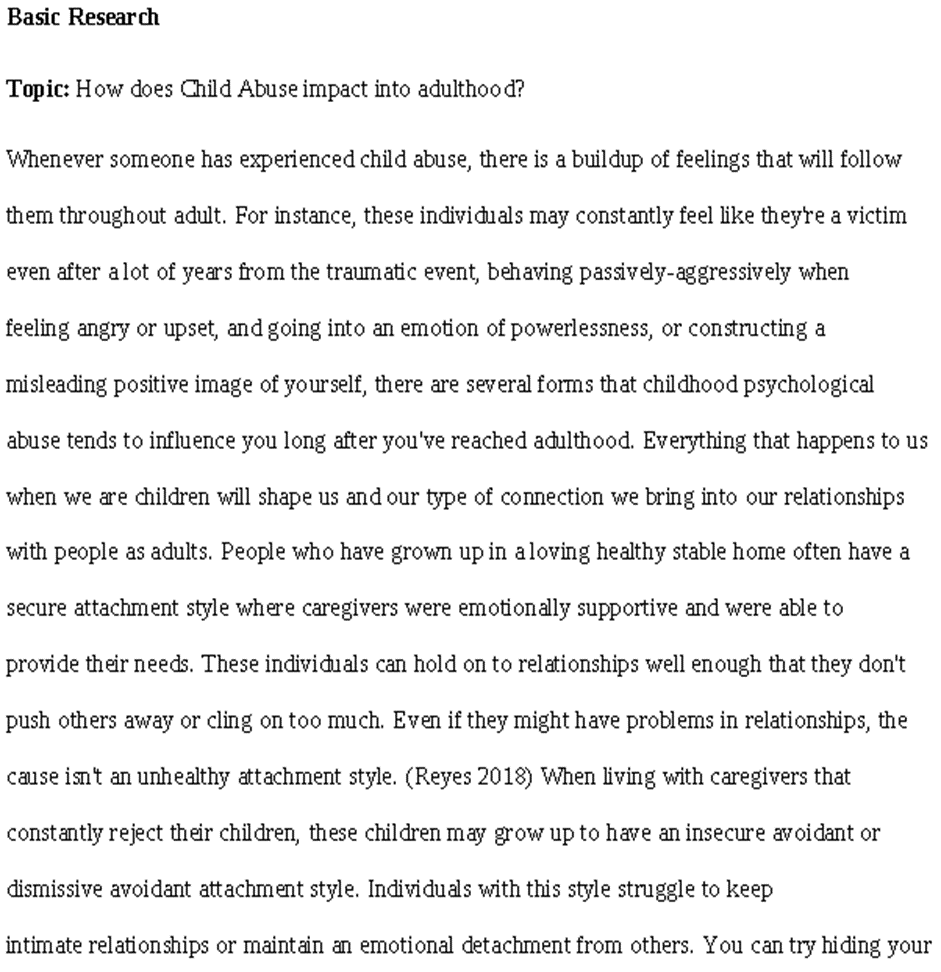

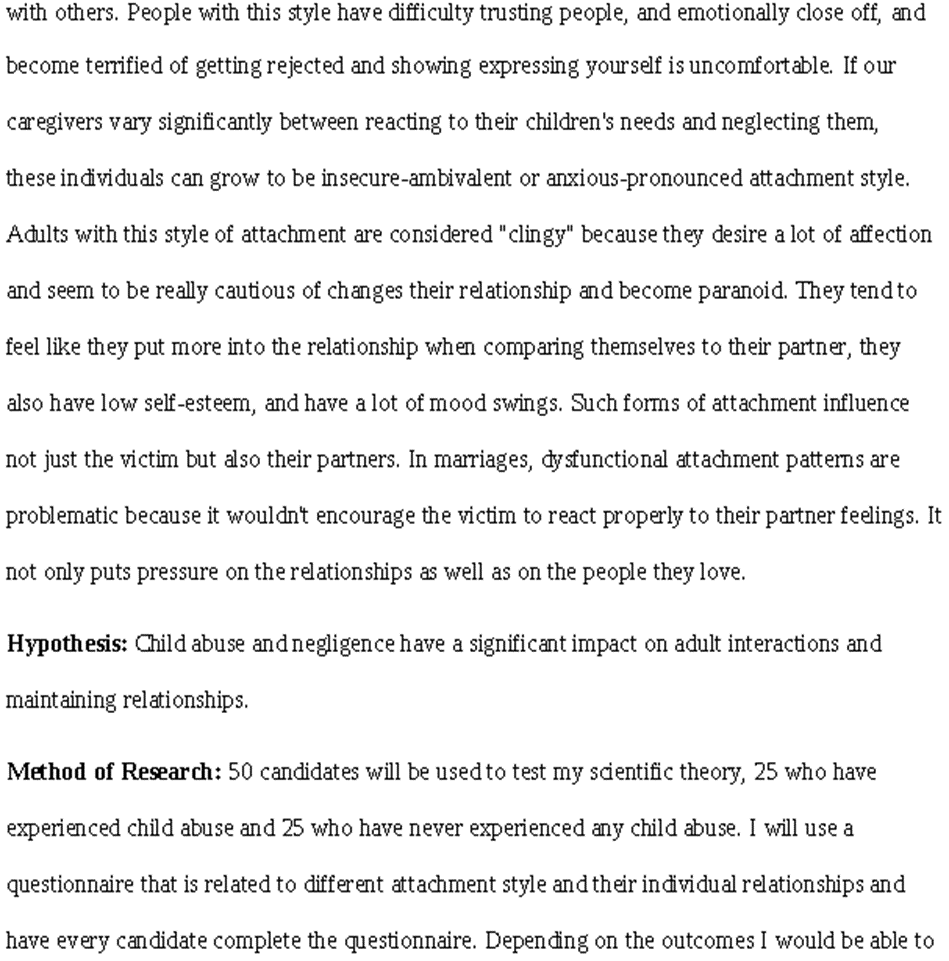
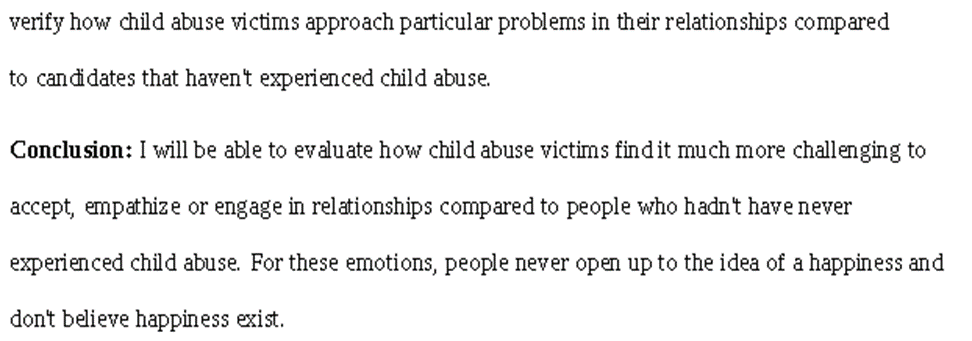
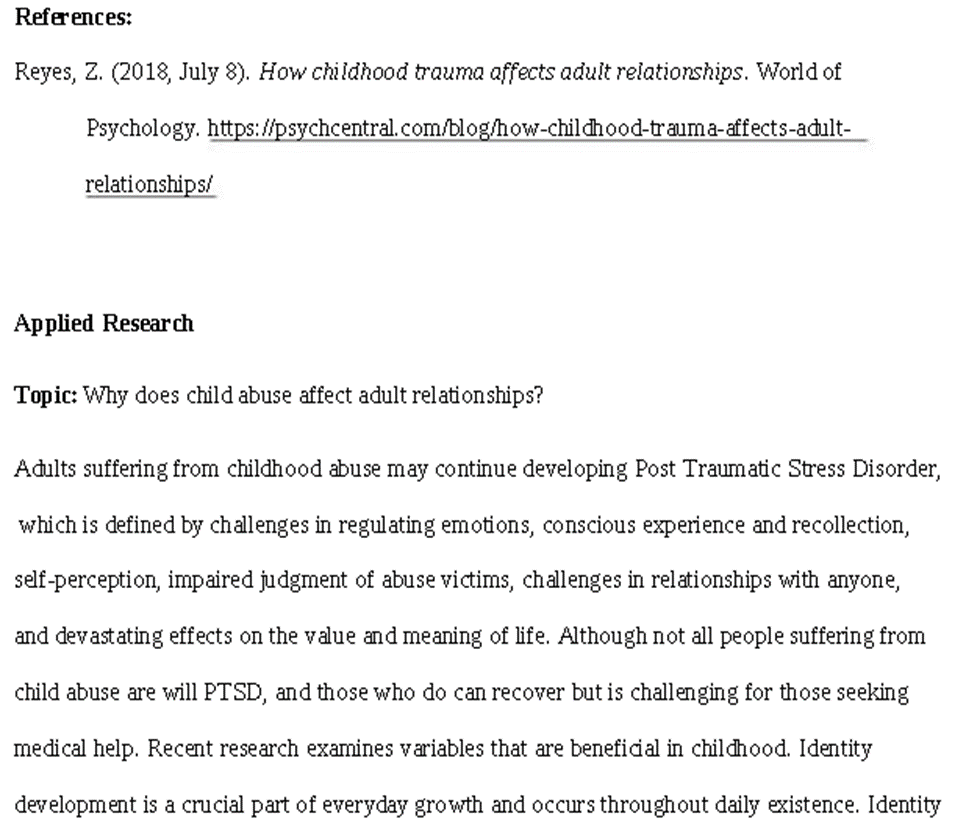
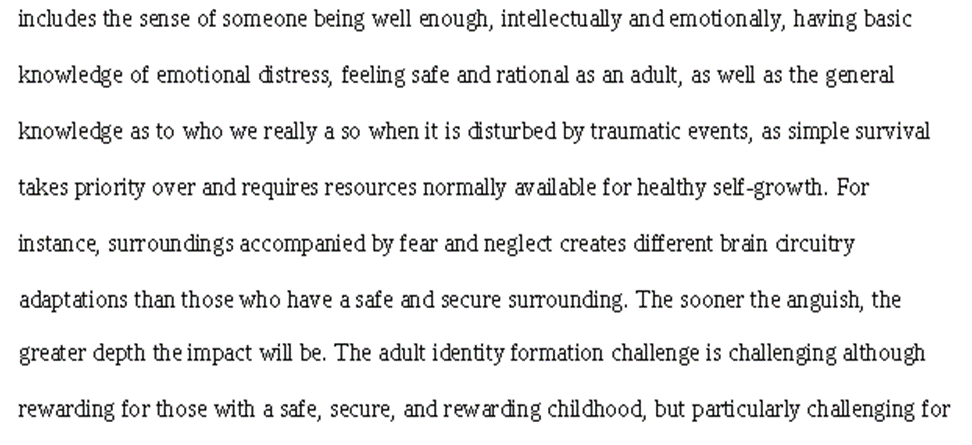
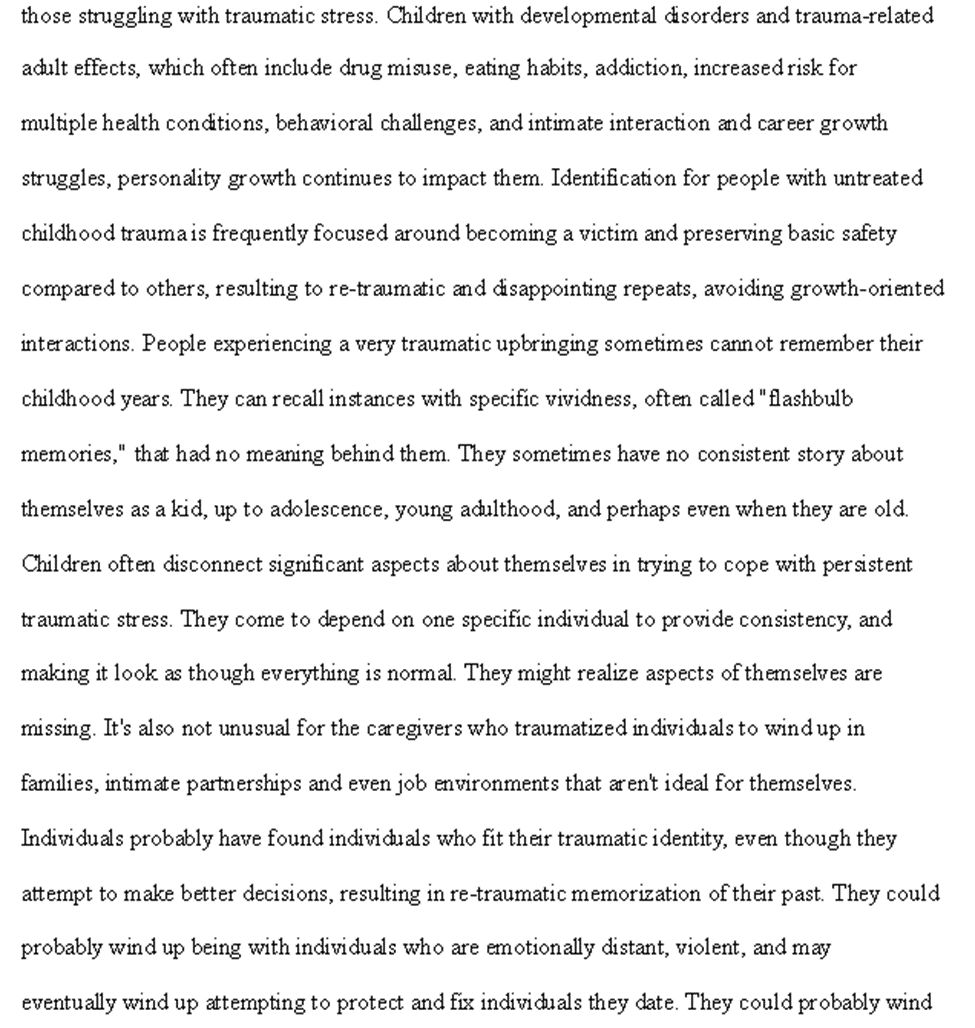

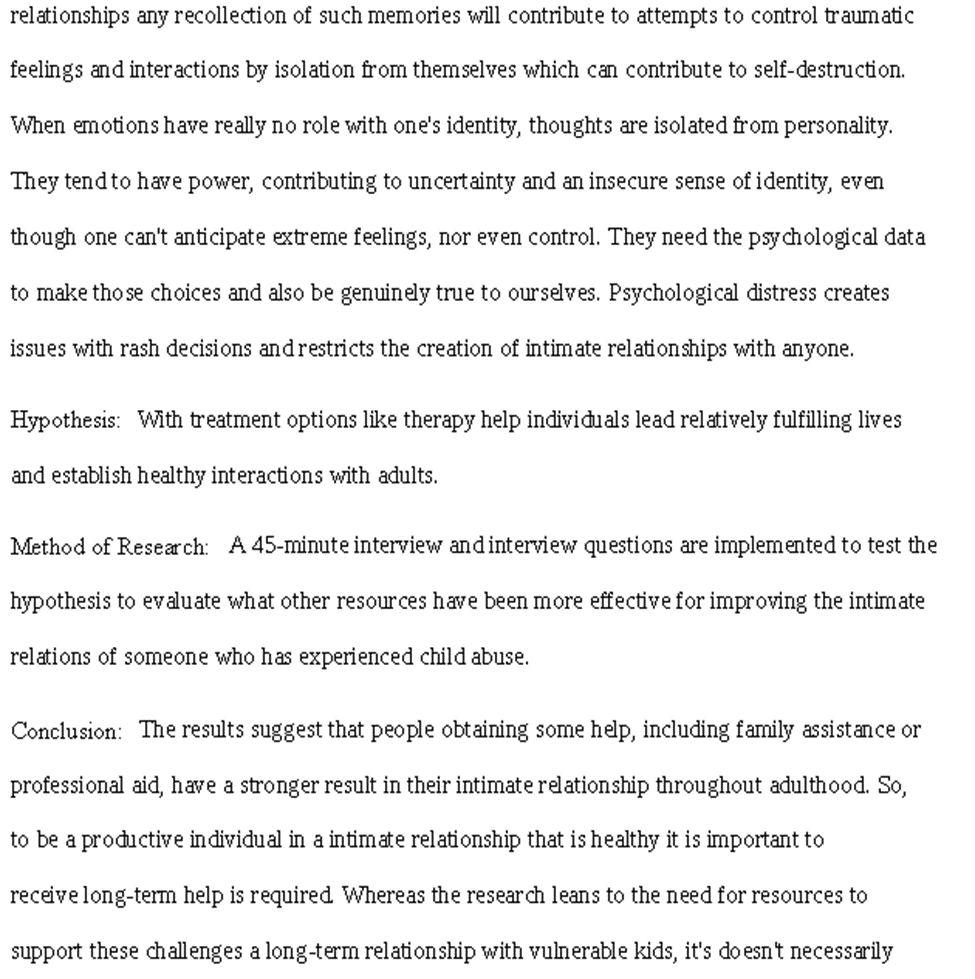

Basic Research Topic: How does Child Abuse impact into adulthood? Whenever someone has experienced child abuse, there is a buildup of feelings that will follow them throughout adult. For instance, these individuals may constantly feel like they're a victim even after a lot of years from the traumatic event, behaving passively-aggressively when feeling angry or upset, and going into an emotion of powerlessness, or constructing a misleading positive image of yourself, there are several forms that childhood psychological abuse tends to influence you long after you've reached adulthood. Everything that happens to us when we are children will shape us and our type of connection we bring into our relationships with people as adults. People who have grown up in a loving healthy stable home often have a secure attachment style where caregivers were emotionally supportive and were able to provide their needs. These individuals can hold on to relationships well enough that they don't push others away or cling on too much. Even if they might have problems in relationships, the cause isn't an unhealthy attachment style. (Reyes 2018) When living with caregivers that constantly reject their children, these children may grow up to have an insecure avoidant or dismissive avoidant attachment style. Individuals with this style struggle to keep intimate relationships or maintain an emotional detachment from others. You can try hiding your emotions, avoid people, keep things private, and shut down when someone expresses themselves. Through these habits and obvious lack of interest in intimacy, individuals who are insecure still deeply seek partnerships and experience loneliness. When parents neglect or abuse their children these individuals may establish a form of attachment which is fearful-avoiding or disorganized- disoriented. If the people you expect to protect and love you is the person who harms you, it makes complete sense that you can reach adulthood to be terrified of being lonely and intimate with others. People with this style have difficulty trusting people, and emotionally close off, and become terrified of getting rejected and showing expressing yourself is uncomfortable. If our caregivers vary significantly between reacting to their children's needs and neglecting them, these individuals can grow to be insecure-ambivalent or anxious-pronounced attachment style. Adults with this style of attachment are considered "clingy" because they desire a lot of affection and seem to be really cautious of changes their relationship and become paranoid. They tend to feel like they put more into the relationship when comparing themselves to their partner, they also have low self-esteem, and have a lot of mood swings. Such forms of attachment influence not just the victim but also their partners. In marriages, dysfunctional attachment patterns are problematic because it wouldn't encourage the victim to react properly to their partner feelings. It not only puts pressure on the relationships as well as on the people they love. Hypothesis: Child abuse and negligence have a significant impact on adult interactions and maintaining relationships. Method of Research: 50 candidates will be used to test my scientific theory, 25 who have experienced child abuse and 25 who have never experienced any child abuse. I will use a questionnaire that is related to different attachment style and their individual relationships and have every candidate complete the questionnaire. Depending on the outcomes I would be able to verify how child abuse victims approach particular problems in their relationships compared to candidates that haven't experienced child abuse. Conclusion: I will be able to evaluate how child abuse victims find it much more challenging to accept, empathize or engage in relationships compared to people who hadn't have never experienced child abuse. For these emotions, people never open up to the idea of a happiness and don't believe happiness exist. References: Reyes, Z. (2018, July 8). How childhood trauma affects adult relationships. World of Psychology. https://psychcentral.com/blog/how-childhood-trauma-affects-adult- relationships/ Applied Research Topic: Why does child abuse affect adult relationships? Adults suffering from childhood abuse may continue developing Post Traumatic Stress Disorder, which is defined by challenges in regulating emotions, conscious experience and recollection, self-perception, impaired judgment of abuse victims, challenges in relationships with anyone, and devastating effects on the value and meaning of life. Although not all people suffering from child abuse are will PTSD, and those who do can recover but is challenging for those seeking medical help. Recent research examines variables that are beneficial in childhood. Identity development is a crucial part of everyday growth and occurs throughout daily existence. Identity includes the sense of someone being well enough, intellectually and emotionally, having basic knowledge of emotional distress, feeling safe and rational as an adult, as well as the general knowledge as to who we really a so when it is disturbed by traumatic events, as simple survival takes priority over and requires resources normally available for healthy self-growth. For instance, surroundings accompanied by fear and neglect creates different brain circuitry adaptations than those who have a safe and secure surrounding. The sooner the anguish, the greater depth the impact will be. The adult identity formation challenge is challenging although rewarding for those with a safe, secure, and rewarding childhood, but particularly challenging for those struggling with traumatic stress. Children with developmental disorders and trauma-related adult effects, which often include drug misuse, eating habits, addiction, increased risk for multiple health conditions, behavioral challenges, and intimate interaction and career growth struggles, personality growth continues to impact them. Identification for people with untreated childhood traumais frequently focused around becoming a victim and preserving basic safety compared to others, resulting to re-traumatic and disappointing repeats, avoiding growth-oriented interactions. People experiencing a very traumatic upbringing sometimes cannot remember their childhood years. They can recall instances with specific vividness, often called "flashbulb memories," that had no meaning behind them. They sometimes have no consistent story about themselves as a kid, up to adolescence, young adulthood, and perhaps even when they are old. Children often disconnect significant aspects about themselves in trying to cope with persistent traumatic stress. They come to depend on one specific individual to provide consistency, and making it look as though everything is normal. They might realize aspects of themselves are missing. It's also not unusual for the caregivers who traumatized individuals to wind up in families, intimate partnerships and even job environments that aren't ideal for themselves. Individuals probably have found individuals who fit their traumatic identity, even though they attempt to make better decisions, resulting in re-traumatic memorization of their past. They could probably wind up being with individuals who are emotionally distant, violent, and may eventually wind up attempting to protect and fix individuals they date. They could probably wind attempting to protect and fix individuals they date. Conversely, effects of negative experience of development projects social interactions can try to avoid sense of connection and distance oneself. Specifically, while childhood abuse has become a core aspect of important relationships any recollection of such memories will contribute to attempts to control traumatic feelings and interactions by isolation from themselves which can contribute to self-destruction. When emotions have really no role with one's identity, thoughts are isolated from personality. They tend to have power, contributing to uncertainty and an insecure sense of identity, even though one can't anticipate extreme feelings, nor even control. They need the psychological data to make those choices and also be genuinely true to ourselves. Psychological distress creates issues with rash decisions and restricts the creation of intimate relationships with anyone. Hypothesis: With treatment options like therapy help individuals lead relatively fulfilling lives and establish healthy interactions with adults. Method of Research: A 45-minute interview and interview questions are implemented to test the hypothesis to evaluate what other resources have been more effective for improving the intimate relations of someone who has experienced child abuse. Conclusion: The results suggest that people obtaining some help, including family assistance or professional aid, have a stronger result in their intimate relationship throughout adulthood. So, to be a productive individual in a intimate relationship that is healthy it is important to receive long-term help is required. Whereas the research leans to the need for resources to support these challenges a long-term relationship with vulnerable kids, it's doesn't necessarily indicate that all abused individuals perceive such concerns. References Brenner, G. H. (2017, July 1). 6 ways that a rough childhood can affect adult relationships. Psychology
Step by Step Solution
There are 3 Steps involved in it
Step: 1

Get Instant Access to Expert-Tailored Solutions
See step-by-step solutions with expert insights and AI powered tools for academic success
Step: 2

Step: 3

Ace Your Homework with AI
Get the answers you need in no time with our AI-driven, step-by-step assistance
Get Started


